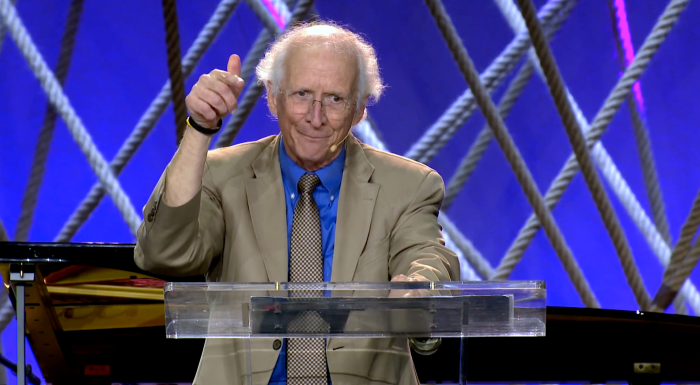
With the growing popularity of online sermons, social media influencers and podcast preachers, discerning sound doctrine from false teaching is more important than ever, according to pastor and author John Piper.
“Set your standards high,” the 79-year-old chancellor of Bethlehem College and Seminary in Minneapolis, Minnesota, said in a recent episode of the “Ask Pastor John” podcast.
“Listen to people who are truly God-centered, Christ-exalting, Bible-saturated, Spirit-dependent, who bear the marks in their lives of authenticity.”
Piper’s comments came in response to a reader who shared a concern about doctrine in the digital age: “The Bible gives us a lot of warnings about false teachers, but how can I identify if someone I listen to on the Internet is a false teacher?” he asked.
“Don’t set the bar so low that you only stop listening to people if they can be properly called false teachers,” Piper said. “Lots of people are teachers who are simply misguided and unhelpful in many ways, but might not come under the ban of being called a false teacher.”
The four biblical tests, Piper said, are the fruit of a teacher’s life, the soundness of their doctrine, their submission to Scripture and their fidelity to the Gospel of grace.
He cited the words of Jesus in Matthew 7, pointing to the importance of examining a teacher’s life.
“You will recognize them by their fruits,” Piper quoted. “So, every healthy tree bears good fruit, but the diseased tree bears bad fruit.”
He acknowledged that evaluating someone’s personal conduct can be difficult when dealing with internet personalities. “Which is why you need to look carefully and take time and belong to a church — a real, live, human-being, flesh-and-blood, in-person church with a real, live preacher whose life you know.”
Drawing from Paul’s example in 1 Thessalonians, Piper noted how the apostle emphasized his own life as evidence of the Gospel’s power. “You know what kind of men we proved to be among you for your sake,” Paul wrote. “So judge us by our lives.”
Next, Piper turned to the theological integrity of a teacher’s message.
Referencing 1 John 4, Piper said the incarnation of Christ is a non-negotiable: “Every spirit that confesses that Jesus Christ has come in the flesh is from God.”
He also quoted 1 Timothy 6, where Paul warns against anyone who “does not agree with the sound words of our Lord Jesus Christ and the teaching that accords with godliness.”
“We need to measure the doctrines that are being taught by the sound words of our Lord Jesus Christ and by their implications for godliness,” Piper said.
A teacher’s attitude toward the authority of Scripture is also key, the Don’t Waste Your Life author said.
Piper cited 1 Corinthians 14:37–38, where Paul declared that those who refuse to acknowledge apostolic teaching are not to be recognized. Similarly, in 1 John 4:6, John wrote, “Whoever knows God listens to us; whoever is not from God does not listen to us.”
“The apostles elevated their teaching to the level of a test of truth,” Piper said. “If a person does not submit his thinking and his teaching to the authority of the apostles — to the authorized teachers of Christ who wrote the New Testament — then they’re not going to be reliable teachers.”
Even if such people occasionally say true things, Piper warned, “that doesn’t make them reliable teachers.”
Finally, Piper emphasized the centrality of the Gospel of justification by faith.
Quoting Galatians 1:8–9, he reminded listeners of Paul’s stern warning: “Even if we or an angel from heaven should preach to you a gospel contrary to the one we preached to you, let him be accursed.”
“Paul is just red-hot about this one,” Piper said, explaining that any gospel that reintroduces law-keeping as a means to justification is a betrayal of grace. “You are severed from Christ, you who would be justified by the law; you have fallen away from grace” (Galatians 5:4), he added.
Piper made it clear that identifying false teaching is a matter of spiritual life and death.
“False doctrine and false teachers aren’t just misleading; they’re soul-endangering. So, we must be on high alert with discernment, deeply rooted in the truth.”
While the internet can be a helpful supplement, the pastor ended with a strong reminder of where spiritual safety lies.
“The best way to protect ourselves from false teachers is to be part of a healthy, Bible-preaching church, and to be prayerfully saturated with the Bible every day.”
In a 2022 op-ed published by The Christian Post, Sam Rainer, president of Church Answers and pastor at West Bradenton Baptist Church in Florida, stressed that “theological training is helpful but not necessary to identify heresy.”
“Jesus answers this question in the Sermon on the Mount. He teaches how few take the narrow and difficult road to discern truth. Jesus then warns about why you should care about discerning truth,” he wrote.
“Beware of false prophets who come disguised as harmless sheep but are really vicious wolves. You can identify them by their fruit, that is, by the way they act’ (Matthew 7:15-16),” he wrote.
“The term ‘fruit’ occurs over one hundred times in the Bible. Fruit usually refers to results. What qualities are manifested in your life? Where do your hours go? Where is your money spent? What words do you communicate? What does your mind consume?
If you are not dedicating hours, mind energy, and eyeballs to God’s Word, then you are going to struggle to know what is true in this world.
Know God’s truth, and the results will follow.”
Leah M. Klett is a reporter for The Christian Post. She can be reached at: leah.klett@christianpost.com
















